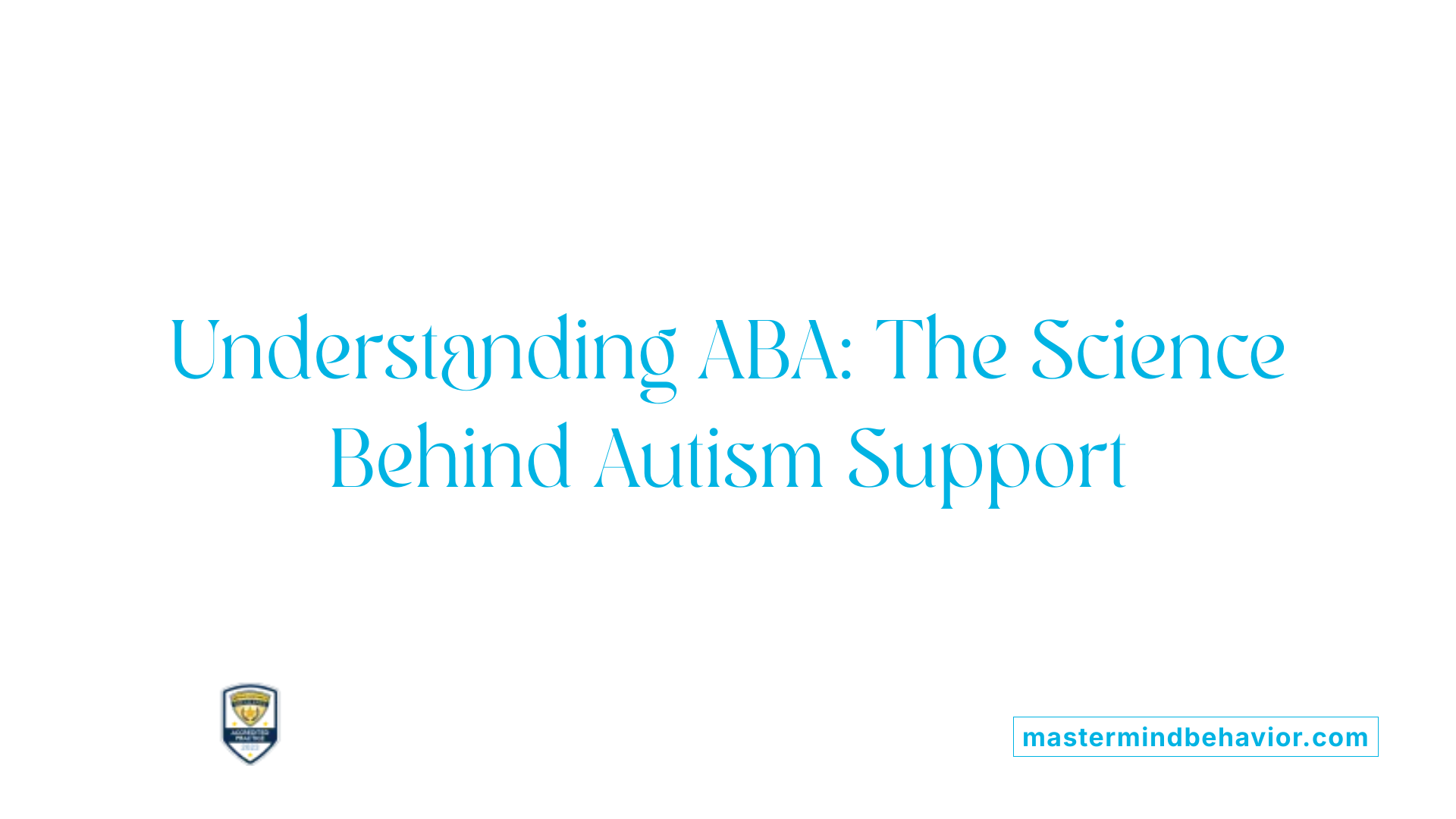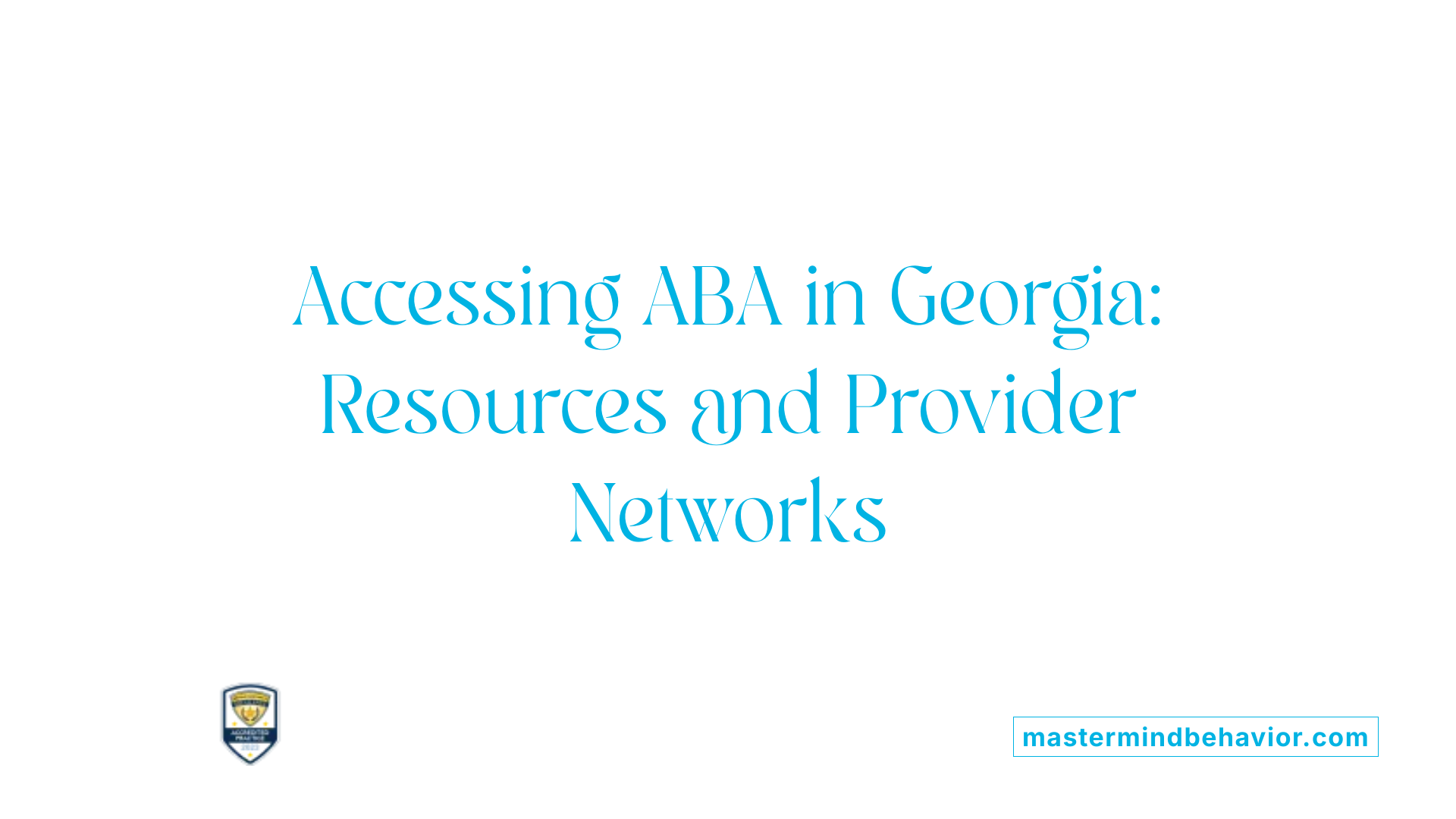Understanding ABA Therapy and Its Role in Autism Support
Applied Behavior Analysis (ABA) therapy is a cornerstone treatment for individuals with autism that has been practiced and refined for over six decades. For families in Georgia seeking effective support services, selecting the right ABA provider requires a clear understanding of what ABA entails, how it is administered, and the qualifications of professionals involved. This article offers a comprehensive guide highlighting essential considerations when choosing an ABA provider in Georgia, ensuring families can make informed decisions that best suit their child's unique needs.
What is ABA Therapy and How Does It Support Individuals with Autism?

Definition of ABA Therapy
Applied Behavior Analysis (ABA) therapy is a science-backed approach widely recognized for its effectiveness in treating autism. Rooted in behavioral psychology, ABA focuses on modifying environmental factors to encourage positive behaviors and reduce those that may be challenging.
Use of ABA for Autism Support
ABA has been a leading treatment method for individuals with autism for over 60 years. It supports skill development in communication, social interactions, and daily living, which are essential for enhancing independence.
Goals of ABA Therapy
The therapy aims to increase socially meaningful behaviors while decreasing behaviors that interfere with learning and socialization. Using techniques like positive reinforcement, ABA tailors interventions to each individual's needs and progress.
Therapy Environments and Collaboration with Families
ABA services occur across various settings, including homes, schools, and community locations. Practitioners such as Board Certified Behavior Analysts (BCBAs) work closely with families to customize therapy plans, ensuring support is consistent and meaningful.
Optum Behavioral Health supports this approach by providing access to a network of autism and ABA providers, emphasizing the use of evidence-based practices and resources to promote quality care and outcomes.
Professional Qualifications and Roles in ABA Therapy Delivery

Types of ABA providers
ABA therapy is delivered by a range of professionals with distinct qualifications and responsibilities. Typically, the therapy is administered by Licensed Behavior Analysts (LBAs) or Certified Behavior Analyst Assistants (CBAAs). These professionals possess specialized training and certifications in behavioral analysis, ensuring high-quality care.
Qualifications required
To become an LBA, individuals generally must complete advanced education, such as a master's degree in behavioral analysis or a related field. They also undergo extensive supervised practical experience, pass a rigorous certification examination, and obtain licensure from their state. For example, in states like New York, these steps are mandatory to ensure practitioners are well-prepared.
Licensing and certification
Licensure confirms that the professional has met all legal and ethical standards to provide ABA therapy. Certification bodies ensure that both LBAs and CBAAs maintain best practices, adhere to evidence-based guidelines, and comply with reimbursement policies. These credentials help families and providers identify qualified ABA specialists.
Supervision and support roles
While LBAs are responsible for designing and supervising treatment plans, conducting clinical assessments, analyzing therapy data, and training other staff, direct therapy may also be conducted by trained unlicensed staff such as therapists or technicians. These personnel follow structured, scripted activities under the supervision of an LBA to maintain treatment fidelity and ensure effectiveness.
Optum Behavioral Health supports these standards by providing resources and networks specifically for ABA providers, including those in Georgia. Their materials on clinical criteria, prior authorization, reimbursement policies, and evidence-based guidelines help maintain the quality and ethical delivery of ABA services.
This organized structure of qualifications and roles helps ensure that ABA therapy for individuals with autism and related conditions is delivered safely, effectively, and according to the highest professional standards.
Core Techniques and Methods Employed in ABA Therapy

What are some common techniques or methods used in ABA therapy for autism?
Applied Behavior Analysis (ABA) therapy utilizes a range of strategies to support individuals with autism in acquiring new skills and decreasing challenging behaviors. These methods are carefully designed to be effective and adaptable to each person's needs.
One widely used technique is Discrete Trial Training (DTT). This approach breaks down skills into small, manageable steps, teaching each part through repeated practice coupled with reinforcement. DTT provides a clear structure that helps learners grasp skills systematically.
Natural Environment Teaching (NET) contrasts with DTT by focusing on teaching within real-life settings. By learning skills in environments where they will naturally be used, individuals are more likely to generalize and apply what they've learned.
Task analysis is another important method, which involves decomposing complex behaviors or skills into smaller, sequential steps. This breakdown simplifies teaching and helps learners progress steadily with clear goals.
Central to all these methods are reinforcement strategies. Positive reinforcement, such as praise or tangible rewards, motivates learners and encourages consistent participation in therapy sessions. These rewards help shape behavior and maintain engagement.
Together, these techniques form the backbone of ABA therapy, creating a structured yet flexible framework that advances the development and well-being of those with autism.
Evaluating the Effectiveness and Limitations of ABA Therapy

How effective is ABA therapy in improving outcomes for individuals with autism?
ABA therapy is one of the most thoroughly researched interventions for autism. Studies have consistently found that intensive and consistent application of ABA principles can significantly enhance communication skills, social interaction, and reduce challenging behaviors in individuals with autism. Early intervention is especially important; children who begin ABA therapy at a young age often show greater developmental progress compared to those who start later. Nonetheless, the results can vary widely based on individual differences, the quality of the program, and the specific needs of the person receiving therapy.
What are the criticisms and potential challenges of ABA therapy?
Despite its proven benefits, ABA therapy has its critics. Some argue that the structured and repetitive nature of the therapy can sometimes be overwhelming or stressful for individuals, potentially affecting their comfort and well-being. The therapy’s focus on behavior modification and compliance raises ethical concerns for some, who feel it may inadvertently limit personal autonomy and self-expression. Additionally, ABA therapy can be costly and may pose accessibility challenges for many families, especially over long durations.
Why is early intervention important in ABA therapy?
Starting ABA therapy early in a child’s development leverages critical periods where the brain is more adaptable. Early intervention often leads to better outcomes in language acquisition, social skills, and adaptive behaviors. This timing allows for building a strong foundation to support lifelong growth.
How does individual variability affect ABA outcomes?
Every individual with autism is unique, meaning their responses to ABA therapy will differ. Factors influencing outcomes include the severity of symptoms, coexisting conditions, family involvement, and the skill and experience of the therapists. Tailoring programs to address these individual characteristics is essential for maximizing benefits.
What should families consider when deciding on ABA therapy?
Families should weigh the benefits and challenges of ABA therapy carefully. It’s important to choose providers who offer personalized and respectful approaches, emphasizing the child’s comfort and personal growth. Reviewing resources on clinical criteria, reimbursement policies, and evidence-based guidelines—such as those offered by organizations like Optum Behavioral Health—can aid families in making informed decisions. Open communication with providers and ongoing monitoring of therapy impact ensures that the child’s needs remain the central focus.
Accessing ABA Services in Georgia: Provider Networks and Resources

What ABA Provider Networks Are Available in Georgia?
Optum Behavioral Health provides a specialized network of providers in Georgia focused on autism, Applied Behavior Analysis (ABA), and Board Certified Behavior Analysts (BCBA). This network supports families and individuals seeking behavioral health services tailored to autism spectrum disorders with localized resources and care options.
What Resources Are Available for ABA Providers?
The platform offers extensive resources to ABA providers, including detailed clinical criteria and evidence-based guidelines. These tools assist providers in delivering best practice treatments and help maintain high standards of care. Additionally, information on prior authorizations ensures that providers can navigate administrative requirements smoothly.
How Do Insurance and Reimbursement Policies Work?
Understanding insurance and reimbursement policies is crucial. Optum provides clear guidance on reimbursement policies relevant to ABA services in Georgia, helping providers manage billing and payment processes efficiently. This support facilitates uninterrupted care delivery and encourages provider participation in the network.
What Role Does Value-Based Care Play?
Optum Behavioral Health is transitioning towards value-based care in behavioral health, focusing on improving care quality and outcomes while controlling costs. This means providers in the network are encouraged to deliver effective, evidence-based ABA treatments that directly benefit patient health and well-being, aligning incentives around successful care outcomes.
These aspects collectively empower Georgia families and providers, making ABA therapy more accessible, efficient, and outcome-focused through the Optum provider network and resources.
Making Informed Choices for Quality ABA Care in Georgia
Selecting an ABA provider in Georgia involves understanding the therapy’s principles, evaluating provider qualifications, and recognizing both the benefits and limitations of the approach. Families should leverage available resources, including specialized provider networks and evidence-based guidelines, to find providers who offer tailored, compassionate, and effective ABA services. Organizations like Optum Behavioral Health contribute by promoting value-based care models that enhance outcomes while managing costs. With careful consideration and support, families can secure ABA therapy that maximizes developmental gains and enriches the lives of individuals with autism within Georgia’s healthcare landscape.









